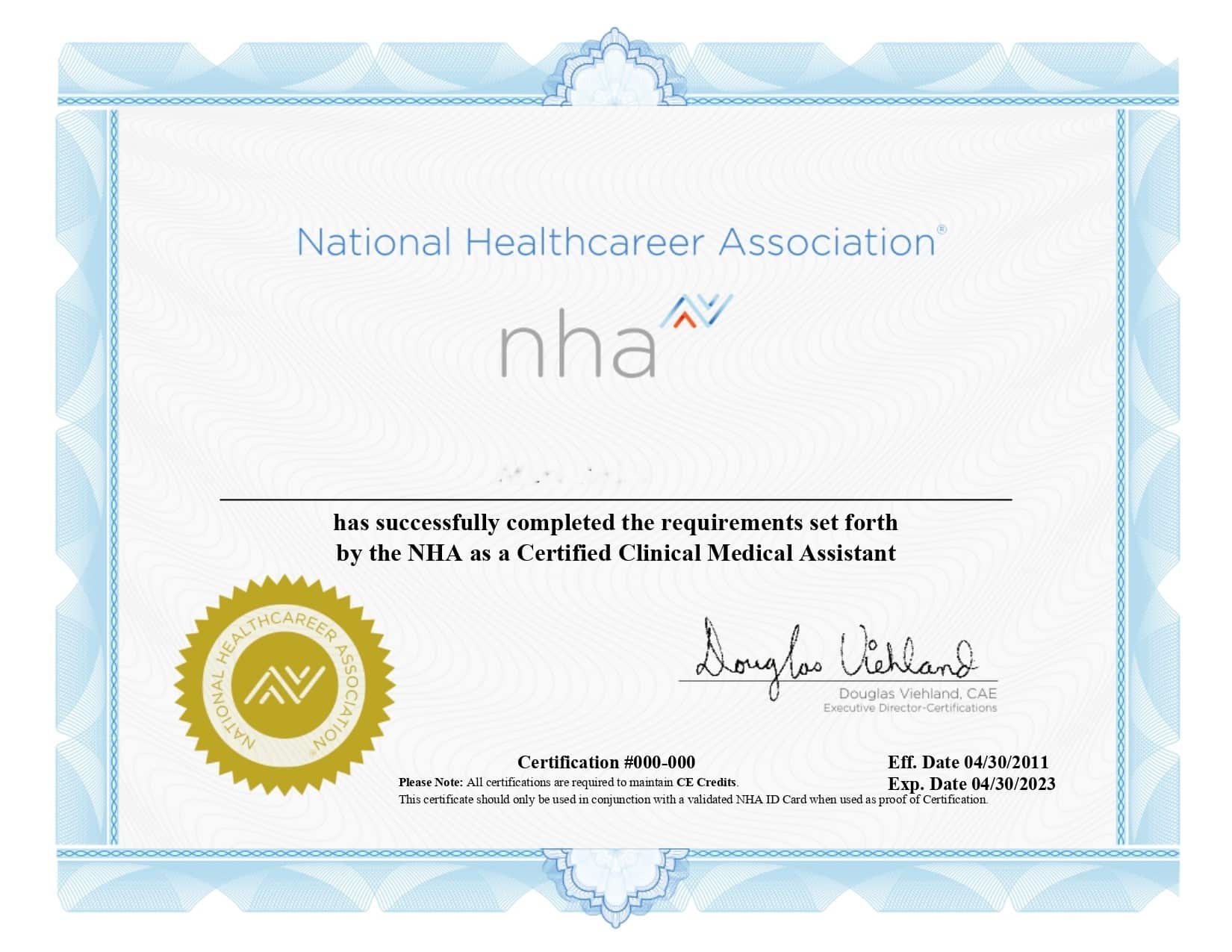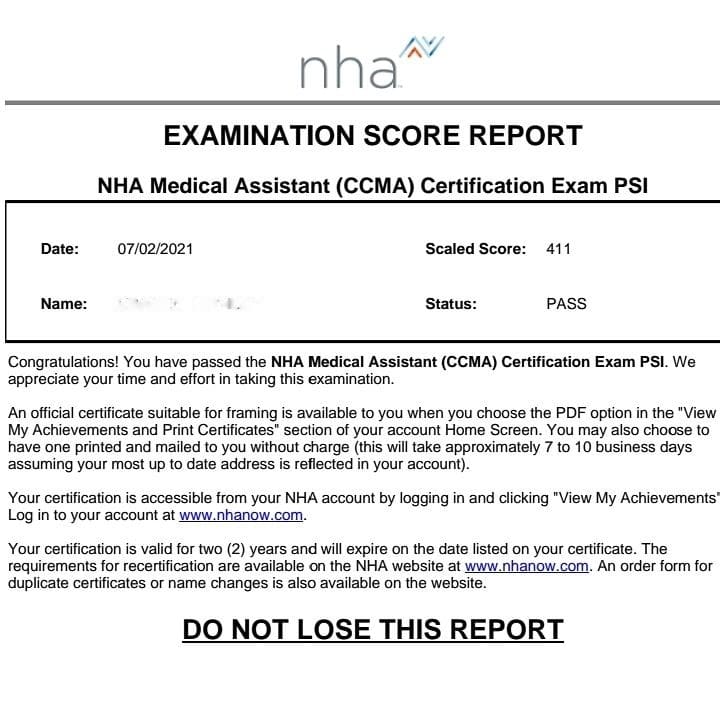
Updates came to the Certified Clinical Medical Assistant (CCMA) exam and prep. The new exam launched in January 2024, and updated study materials aligned to the new exam became available. The iPREP course complied with the new 2024 NHA CCMA exam.
Becoming a CCMA (Certified Clinical Medical Assistant) opens up many opportunities in the healthcare industry. As a Clinical Medical Assistant, you’ll play a vital role in patient care and assisting physicians and other healthcare professionals in various clinical settings. This rewarding career path requires a solid foundation of medical knowledge, excellent communication skills, and the ability to perform clinical tasks precisely.
The NHA CCMA exam is a crucial step toward obtaining your certification. It assesses your understanding of medical terminology, anatomy and physiology, clinical procedures, pharmacology, medical law and ethics, and more. This prep guide aligns with the latest exam content, ensuring you have the tools to tackle each section confidently.
The NHA exam consists of 150 scored questions. 30 additional pre-test questions are also part of the exam and are utilized to gather data about the candidate. They do not impact the candidate’s overall score. Test-takers are provided with three hours to complete the CCMA certification exam.
This prep guide offers a wealth of valuable resources. Comprehensive content reviews will reinforce your understanding of key medical concepts. Practice questions and realistic simulated exams will allow you to gauge your readiness and identify areas that require further attention. Expert tips and strategies will guide you through exam-taking, helping you manage your time effectively and confidently approach each question.
Question types explained
Results scale & interpretations
Frequently asked questions
The questions included in the CCMA Januar 2024 exam fall under seven topic areas or domains. The domains divide into subcategories which account for various percentages of the overall score.
Here are the details concerning each domain:

NHA CCMA Sample Certificate. Source: NHA
The language used in NHA CCMA materials and exams is English, the primary language in the healthcare industry. Since the NHA CCMA certification is not limited to a specific region or locality, individuals from various parts of the United States can pursue this certification to enhance their career prospects in the healthcare field.
iPREP: Concise. Focused. What you need.
Preparing for the CCMA (Certified Call Center Manager) exam requires careful planning and study. Be well-prepared and manage your time effectively on exam day. Here are some tips to follow on the day of the CCMA exam:
“I was panicking at first because I could not remember my login info for my school’s computer, and fortunately, I just tried a bunch of passwords and was able to get in. It’s also extremely important you remember your NHA login information. You don’t want to end up chatting with a live agent to get your username/password. I suggest making a note of your login credentials on your phone, and it would be helpful to try logging in the night before or the morning of to make sure everything works”
Source: MedicalAssistant/reddit
Remember, these tips will guide you on the day of the CCMA exam. Have a solid study plan and dedicated preparation leading up to exam day. Good luck!
The NHA CCMA certification refers to the Certified Clinical Medical Assistant certification offered by the National Healthcareer Association (NHA). It is a nationally recognized credential that validates the knowledge and skills of individuals seeking to work as clinical medical assistants in the healthcare industry.
The following requirements must be met by students to take the NHA CCMA exam:
Possessing a high school diploma, GED, or equivalent.
Successful completion of a medical assistant training program during the previous five (5) years OR one (1) year of supervised employment in the medical assisting industry within the last three (3) years
Students may acquire provisional certifications before graduating from high school. Here are some important details to remember:
Students in high school who are eligible must sign up for the exam within a year of graduating.
A temporary certificate loses its validity one year after the exam date.
Graduates can request to have their active provisional certificate converted to a full certificate once they graduate.
It costs $160 to sign up for the CCMA test.
You must sign up for an account on the NHA website to pay the NCMA test cost. You’ll also be required to provide supporting papers proving your eligibility.
Expect a response to your certification application in one or two weeks. Once authorized, the NHA will send you an email with instructions on scheduling your exam at a nearby PSI testing facility.
What topics are on the NHA CCMA certification exam?There are 150 scored questions on the exam that fall under domains that account for various percentages to make up the entire question paper:
1. Foundational Knowledge and Basic Science (10%)
2. Anatomy and Physiology (8%)
3. Clinical Patient Care (54%)
4. Patient Care Coordination and Education (5%)
5. Administrative Assisting (13%)
6. Communication and Customer Service (5%)
7. Medical Law and Ethics (5%)
Review the exam content outline, utilize study materials provided by NHA, practice with sample questions, join study groups, and consider taking practice exams to get familiar with the format and content of the exam.
Candidates that do not qualify for the CCMA exam on their first attempt will get two additional opportunities to pass. However, there must be a minimum gap of 30 days between each exam.
Are there any continuing education requirements to maintain the NHA CCMA certification?Yes, there are continuing education (CE) requirements to maintain the NHA CCMA certification. To renew the certification, individuals must accumulate ten continuing education credits within the two-year certification period.
The National Healthcareer Association (NHA) Certified Clinical Medical Assistant (CCMA) exam results are a scaled score rather than a specific numerical score. The scaled score is a standard method that equates the difficulty level of different exam forms and ensures fairness across all test takers.
The scaled scores for the CCMA exam are in three categories: Pass, Provisional Pass, and Fail. The specific score ranges may vary slightly depending on the exam version, but here is a general breakdown:
Pass: This indicates that the candidate has demonstrated the necessary knowledge and skills to meet the minimum competency requirements for certification as a Clinical Medical Assistant. The score range for a pass may vary but generally falls within the higher end of the scaled score range.
Provisional Pass: This status indicates that the candidate has achieved a scaled score close to the passing range but requires additional steps to meet the certification requirements. Candidates who receive a provisional pass may need to complete specific tasks or provide documentation to obtain full certification.
Fail: Candidates who do not achieve the minimum scaled score necessary to meet the certification requirements will receive a failed result. These candidates did not demonstrate the knowledge and skills needed to pass the CCMA exam.
It’s important to note that the NHA determines the exact score ranges for each category. Scores may be adjusted periodically to maintain consistency and fairness in the certification process. For the most accurate and up-to-date information, refer to the NHA’s official website or contact them directly.

Test Administrators: The National Healthcareer Association (NHA) administers the CCMA. NHA is an organization that provides certifications for various healthcare professions, including the Certified Clinical Medical Assistant (CCMA) certification.
Test Format: Multiple choice on computer
Test Materials: Only a computer system is required
Cost: You must pay $160 to sign up for the CCMA test.
Retake Policy: A candidate can retake the test two times with a minimum interval of 30 days between each attempt.
The National Healthcareer Association (NHA) provides the Certified Clinical Medical Assistant (CCMA) certification. It is a professional certification agency that offers a variety of certifications for healthcare professionals, including medical assistants, phlebotomists, pharmacy technicians, and more. The CCMA certification is for individuals seeking to become clinical medical assistants. It validates their knowledge and skills in patient care, clinical procedures, medical office management, and communication.
Disclaimer – All tutoring resources and preparation materials available on iPrep are authentic and designed for tutoring. iPrep is not affiliated with the National Healthcareer Association (NHA), the owner of the Certified Clinical Medical Assistant (CCMA) certification test, or any trademark or organization mentioned above.
Free NHA CCMA practice test: Get to know what the NHA CCMA test will be like by practicing with these sample questions:
Question 1 of 11
What does the medical abbreviation “SOB” commonly indicate?
The correct answer is A. Shortness of breath.
Explanation:
Question 2 of 11
Which of the following is the correct order of the chambers of the heart through which blood flows?
The correct answer is A. Right atrium, right ventricle, left atrium, left ventricle.
Explanation:
Question 3 of 11
Which of the following structures is responsible for the production of red blood cells?
The correct answer is C. Bone marrow.
Explanation:
Question 4 of 11
Which of the following methods is used to administer medication through the skin?
The correct answer is D. Topical.
Explanation:
Question 5 of 11
Which of the following is the correct sequence of steps for handwashing?
The correct answer is A. Wet hands, apply soap, rinse thoroughly, dry with paper towel.
Explanation:
Question 6 of 11
Which of the following positions is commonly used for examining the chest and lungs?
The correct answer is D. Fowler’s position.
Explanation:
Question 7 of 11
Which of the following is the correct technique for measuring blood pressure using a sphygmomanometer and stethoscope?
The correct answer is B. Place the diaphragm of the stethoscope over the brachial artery.
Explanation:
Question 8 of 11
Which of the following is an example of a medical assistant’s responsibility related to medical billing and coding?
The correct answer is C.Verifying health insurance coverage.
Explanation:
Question 9 of 11
You receive a call from a patient who wants to reschedule their upcoming appointment due to a scheduling conflict. What is the most appropriate course of action as a medical assistant in an administrative role?
The correct answer is B. Check the provider’s schedule and offer the patient alternative appointment times based on availability.
Explanation:
Question 10 of 11
During a phone call with a patient, you encounter a language barrier as they do not speak English fluently. What is the most appropriate course of action?
The correct answer is C. Seek assistance from an interpreter or a language translation service
Explanation:
Question 11 of 11
Which of the following principles is associated with the concept of patient autonomy?
The correct answer is D. Informed consent.
Explanation: